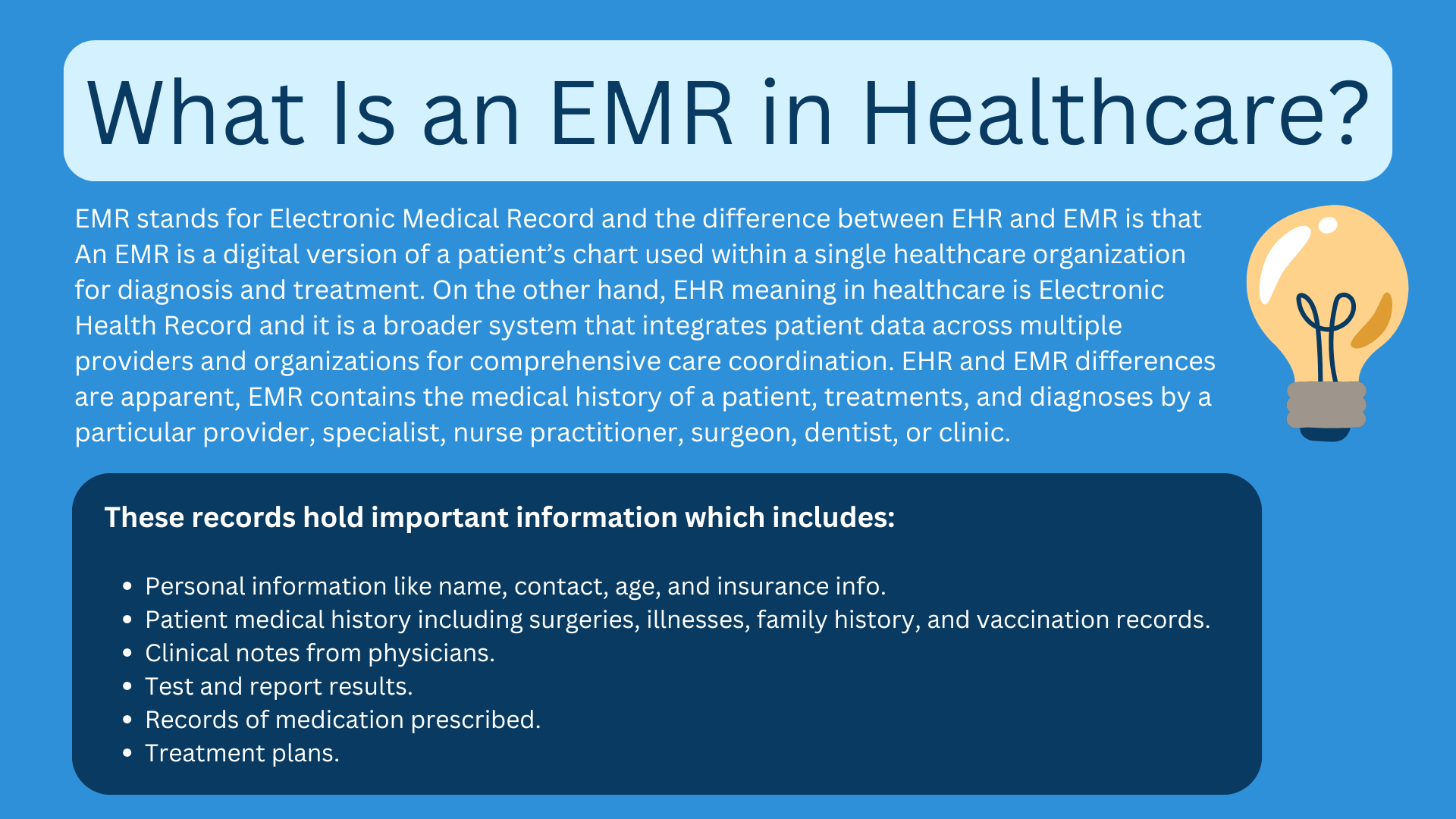Introduction
In recent years, the U.S. healthcare industry has experienced the technological transition from paperwork to digital recordkeeping. These innovative changes are transforming the workplace operation of healthcare facilities, clinics, doctor’s offices, and nursing facilities. Health organizations and the federal government invested billions of dollars to fund the software, hardware, and training necessary to complete the changeover.
The mandated switch to electronic records generated a huge news coverage with stories about EMR Vs. EHR in healthcare and what is an EMR system peppering both mainstream and medical publications. These two terms are often used with interchangeability which creates confusion.
However, there is a huge difference between EMR and EHR.
What Is an EHR in Healthcare?
An electronic health record is an advanced and digital version of a patient chart, but it provides a more inclusive snapshot of a patient’s medical history. Electronic health records are designed in a way to be shared with other healthcare providers to develop mutual coordination. So EHR works as a bridge to bring different healthcare providers and institutions together. Authorized users may immediately access the EHR of patients from different providers.
EHRs role is like a centralizing force for healthcare providers to get increased access to patient information. This software provides a detailed view of a patient’s health history and status, enabling healthcare providers to make informed decisions regarding possible treatments, diagnoses, and ongoing care plans.
What Is the Difference Between EHR and EMR?
It is easy to differentiate between EHRs and EMRs. An EMR is a narrower view of a patient’s medical history while an EHR is a more comprehensive report of the patient’s overall health.
It’s easy to remember the distinction between EHRs and EMRs if you think about the term “health” versus the term “medical.” An EHR is a more comprehensive report of the patient’s overall health, while an EMR is a narrower view of a patient’s medical history. EHR Vs EMR difference is like the difference between medical and health.
Here we explain in detail the EMR Vs EHR systems to help you get a better understanding of the advanced and technologically innovative systems introduced in the healthcare industry. It is a brief but well-researched detail as to what is the difference between EMR and EHR.
EHR Healthcare (Electronic Health Records) | EMR Healthcare (Electronic Medical Records) |
| A more comprehensive view provides detailed information on the patient’s health history. | Digital version of a patient’s paper-based medical records and information. |
| Ensures interoperability between healthcare facilities and providers. | Limitations on transferability between healthcare organizations. |
| The history of the patient moves as the patient moves to another provider. | The history of a patient stays within the healthcare organization. |
| Utilized for decision-making. | Utilized for diagnosis and treatment plans |
Advantages and Disadvantages of EHR and EMR
The latest technological advancements are rapidly revolutionizing nearly every aspect of life, demanding a unique set of innovative skills from professionals to stay competitive, and the healthcare industry is no exception to this remarkable progress. With the emergence of advanced tools introducing new pathways of operational efficiency and transparency in the healthcare industry, healthcare providers are exploring important queries such as what is an EMR in healthcare, EMR and EHR difference, and what is EMR in healthcare to find the best to transform their revenue and operations.
Here we explain the advantages and disadvantages of the two and explain what is the difference between an EMR and an EHR.
While both EMRs and EHRs are digital records holding medical information for patients both have distinctive sets of advantages and disadvantages, depending on the way healthcare professionals utilize them.
The advantages of EHRs are:
- Transparent way of sharing updated, real-time information between healthcare providers and institutions.
- A comprehensive medical history of the patient from radiology and allergy images to lab results.
- Access to important tools that healthcare providers can use for decision-making such as alerts and guidelines.
The Disadvantages of EHRs Are:
- Costly and complex integration and implementation process
- Technical issues arise from excessive reliance on technical infrastructure which could negatively impact accessibility to data and overall patient care.
- It can become a source of frustration among healthcare providers given its poor performance experienced by users.
Advantages of EMRs over paper records include:
- Increasing record management efficiency through the best data tracking features.
- Reducing the risk of medical errors or damaging patient records.
- Digitized scheduling automated reminders and electronic prescribing, streamlining the workflow of healthcare facilities.
Limitations and Risks of EMRs
- Restricted data sharing with various healthcare providers or healthcare facilities.
- Limited patient health history.
- Privacy and cybersecurity concerns.
Given the discussion above, both EMRs and EHRs have advantages and disadvantages, it depends on the priorities and preferences of the healthcare providers as to how they measure EHR versus EMR and utilize these tools to produce the best results.
Do Hospitals Use EMR and EHR?
The use of EMR Vs EHR systems goes side by side. There are a variety of reasons behind hospitals using EHRs over EMRs for a variety of reasons. EHR EMR difference is quite apparent, EHR is more comprehensive patient data and it has the strength to exchange data more transparently. This operational efficiency in Medical Billing results in a deeper understanding of patients and their requirements, leading to improved patient care. On the other hand, EMRs are still used by many hospitals, clinics, and clinician offices, but EHRs provide more detailed healthcare history from all clinicians who provided treatment to the patients and health-related detail is easily transferred between different institutions.
Impacts of Electronic Records on the Healthcare Industry
There is no denying the fact that both EMRs and EHRs offer potential benefits to patients and healthcare providers:
- With accurate, fast, and updated information, medical errors can be reduced and healthcare efficiency improved.
- Patient charts are clearer and more complete-requiring no more deciphering illegible scribbles.
- Information sharing reduces duplicate testing, saving providers and patients time and money.
- Enhanced accessibility to patient information makes it easier for providers to prescribe medications.
- Encouraging patient participation ensures a healthier lifestyle and more frequent use of preventative care.
- More detailed information means more accurate diagnoses.
With the use of EMR Vs EHR systems, healthcare facilities’ operations have become more feasible, accurate, and less costly.
EMR Versus EHR: Which to Choose for Your Practice as the Right One
Now you have a profound understanding of the differences between EHR and EMR systems and what are EMRs in the healthcare industry etc., it is time to decide which tool can deliver the best results for your healthcare practice. There are a few important things to take into consideration before deciding, which include the clients you see, your practice, and how you collaborate with other clinicians. Before deciding to choose between the two, the following questions are crucial to ask:
- Are you a highly specialized provider? If yes, an EMR might prove more useful for you.
- Do you frequently work with other healthcare providers for the care plan for one client? If yes, then EHR is the right choice for you.
- Are you looking for more robust and additional features to run your practice? If yes, then EHR is an appropriate choice for you.
In addition to that, a few other questions you should ask yourself such as how many other staff members you have, your budget, and your outstanding technology needs also factor into your decision. Regardless of the type you choose, a digital practice management system will help you improve operational efficiency, accuracy, and transparency which in return will boost your client’s confidence and patient care services.
EHR Vs EMR: Why EHR?
Comparatively speaking, the EHR system is more helpful in delivering efficient care services in the healthcare industry. It safely stores health information and data allows for electronic prescribing and electronic communications, analyzes outcomes, increases the quality of administrative operations, and provides patient support.
One of the major differences between the two is that EHR systems allow patients to have a significant role in their healthcare management. Patients have access to their medical information, track their health history, and contact their healthcare provider. Hopefully, this will result in a more health-conscious population enjoying healthier lifestyles.
FAQS
What is the main difference between EHR vs EMR systems?
EMR systems focus on managing patient records within a single healthcare organization, serving as digital versions of paper charts. EHR systems, however, are designed for sharing patient data across multiple organizations, enabling comprehensive, coordinated care.
EMR vs EHR: What is the difference?
EMR is a digital version of a patient’s chart used within a single healthcare facility for diagnosis and treatment. EHR, on the other hand, integrates and shares patient data across multiple organizations to enable coordinated and comprehensive care.
What Is EMR meaning in healthcare?
EMR stands for Electronic Medical Record, which is a digital version of a patient’s medical chart. It contains detailed information such as medical history, diagnoses, treatments, and test results, primarily used within a single healthcare organization for patient care management.
What are the key features of EMR vs EHR?
EMR focuses on a patient’s medical records within one facility, while EHR allows secure data sharing across multiple providers for coordinated care.
Which is better for patient care: EMR or HER?
EHR is better for patient care as it supports seamless data sharing, improving care coordination and outcomes across multiple healthcare providers.
How do EMR and EHR differ in terms of data sharing?
EMR is limited to one organization, while EHR enables secure sharing of patient data across multiple facilities and providers.
How does Pro Medical Billing Solutions excel in managing EHR vs EMR systems to deliver premium results?
Pro Medical Billing Solutions expertly handles EHR and EMR systems, ensuring seamless data management, accurate billing, and top-tier results through their advanced expertise and precision-driven approach.




